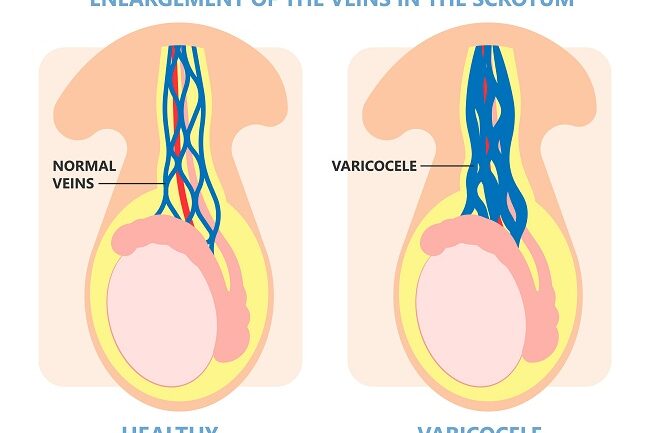When you think about varicose veins, you might picture an older woman with bulging veins in her legs. So it might be a shock to learn that varicose veins can also appear on the testicles and that the condition (also known as varicoceles) is pretty common among younger men.
What causes testicular varicose veins?
Why testicular varicose veins show up isn’t known for certain. But vein specialists suspect that it’s the result of puberty. Or, more specifically, the combination of rapid growth and hormone changes.
You see, the spermatic cord holds up each testicle and all the veins and arteries supplying their blood. The more you grow, the greater the blood supply the testicles require. This influx leads to increased pressure in the veins, which can cause blood to pool instead of heading to the heart (aka reflux).
What are the symptoms of a varicocele?

illustration of testicular varicose veins. On the left is a healthy testicle, and on the right is one with a varicocele
Typically, a varicocele will appear on the left side of the scrotum and be symptomless. But some unlucky people with the condition may experience:
Pain
The pain will typically be a dull ache that’s at its worst in the evening or when you’ve been standing for long hours. It will also usually get better when you lie down.
Swelling
Because of the pooling blood, excess fluids may leak into surrounding tissue, causing the affected testicle to swell.
Lumps or a worm sack
When a testicular varicose vein gets large enough, it will protrude. You may feel a lump or what’s described as a ‘bag-of-worms’ mass.
Are varicoceles dangerous?
Usually, no. But, as with any other varicose vein, they may cause more dangerous conditions.
For one, poor or impacted blood flow in the groin affects your ability to produce testosterone and sperm. And for two, every part of your body, including the testes, requires a steady blood supply. So if the circulation in that region gets bad enough for long enough, the affected testicle may atrophy.
But don’t panic. We know it sounds bad. But not every varicocele leads to infertility, and the chances of atrophy are extremely low.
What are the treatment options?
And on top of that, there are several safe and minimally invasive treatment options.
Varicocelectomy
A surgeon will put you under local anaesthesia and make several small incisions in the affected testicle to remove the problem veins.
Embolisation
A less scary method, embolisation is similar to our varicose leg vein treatments. It involves injecting a substance (usually medical superglue or a sclerosant) into the problem vein through a catheter or a syringe.
Do I have to get treatment?

Man walking on a beach with his wife
That largely depends on your condition. If the varicocele isn’t bothering you too much or affecting your fertility, you may be able to get away with some symptom relief steps:
- Wear supportive underwear. On the same principle as compression socks, compression underwear will boost the circulation in that area and compress the veins so there’s less space for blood to pool.
- Ice packs and over-the-counter anti-inflammatories like ibuprofen can relieve discomfort.
- Change up your routine. Strenuous exercise, long hours of sitting and standing, and smoking worsen varicose vein symptoms. So, opt for gentler exercise like walking or swimming and take a break to wander around. You might also try adding more vitamin C, fibre, and flavonoids to your diet to help improve your veins’ health.
But, as with every varicose vein, your condition may worsen over time if left unchecked.
In short,
Testicular varicose veins (Aka varicoceles) are a pretty common condition. And generally, they aren’t bothersome or dangerous. However, they can get worse and cause uncomfortable symptoms, so it might be in your best interest to seek specialist advice.
Want to learn more about vein health, varicose veins, and other vein conditions? Check out our vein repository.
See where else varicose veins can appear: Where Can Varicose Veins Pop Up